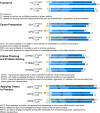Students Perceive Similar Gains in Collaboration, Communication and Professional Skills in Two Distinct Experiential Learning Courses
- PMID: 40229957
- PMCID: PMC11996701
- DOI: 10.1002/prp2.70095
Students Perceive Similar Gains in Collaboration, Communication and Professional Skills in Two Distinct Experiential Learning Courses
Abstract
Experiential learning (EL) is a high-impact teaching practice. Despite this, it can be challenging to embed EL into educational curricula at scale due to resource constraints, such as the number of faculty members available to supervise research projects. Here we report on two distinct elective courses in a Pharmacology curriculum, both of which incorporate EL in different ways. The first course, Pharmacology and Toxicology in Society, involves community partnerships and a focus on harm reduction and drug misuse. The second course, Biomedical Incubator Capstone Project, includes student teams working as a simulated biotechnology startup. Our research questions were: (1) To what extent did students perceive gains in their skills in four domains: teamwork, career preparedness, critical thinking and problem solving, and application of theory to practice ? (2) Did student responses differ between the two EL courses? We surveyed students in both courses over three iterations to assess their perceived gains in skills across these four domains. Surveys contained both quantitative (Likert) elements and qualitative open-ended questions. We conducted mixed methods analyses of student responses. Overall student responses were positive to Likert prompts (87%-96% either agreed or strongly agreed) exploring these domains. Thematic analysis of responses to open-ended questions highlighted the transformative nature of EL experiences in both courses. Our work highlights the finding that strikingly different EL experiences can result in similar student perceptions of gains in teamwork, career preparedness, critical thinking and problem solving, and application of theory to practice. The work demonstrates the effectiveness of expanded opportunities for quality EL in Pharmacology programs and beyond.
Keywords: application of knowledge; experiential learning; higher‐order thinking; professional skills; reflection; teamwork.
© 2025 The Author(s). Pharmacology Research & Perspectives published by British Pharmacological Society and American Society for Pharmacology and Experimental Therapeutics and John Wiley & Sons Ltd.
Conflict of interest statement
The authors declare no conflicts of interest.
Figures

References
-
- Burch G. F., Giambatista R., Batchelor J. H., Burch J. J., Hoover J. D., and Heller N. A., “A Meta‐Analysis of the Relationship Between Experiential Learning and Learning Outcomes,” Decision Sciences Journal of Innovative Education 17, no. 3 (2019): 239–273, 10.1111/dsji.12188. - DOI
-
- Instructional Technology, Graduate School, Universitas Negeri Malang, Indonesia , M H., INS D., et al., “The Effect of Experiential Learning and Adversity Quotient on Problem Solving Ability,” International Journal of Instruction 13, no. 1 (2020): 869–884, 10.29333/iji.2020.13156a. - DOI
-
- Kuh G. D., “What We're Learning About Student Engagement From NSSE: Benchmarks for Effective Educational Practices,” Change: The Magazine of Higher Learning 35, no. 2 (2003): 24–32, 10.1080/00091380309604090. - DOI
-
- Kolb A. Y. and Kolb D. A., “Experiential Learning Theory: A Dynamic, Holistic Approach to Management Learning, Education and Development,” in The SAGE Handbook of Management Learning, Education and Development (SAGE Publications Ltd, 2009), 42–68, 10.4135/9780857021038.n3. - DOI
-
- Gavillet R., “Experiential Learning and Its Impact on College Students,” 2018, 10.26153/TSW/21. - DOI
MeSH terms
Grants and funding
- 2021-R3-C340/Co-operative Education and Work-Integrated Learning Canada
- 2021-R3-C406/Co-operative Education and Work-Integrated Learning Canada
- 2022-R3-C733/Co-operative Education and Work-Integrated Learning Canada
- 2022-R3-C772/Co-operative Education and Work-Integrated Learning Canada
- 2023-R3-C1221/Co-operative Education and Work-Integrated Learning Canada
LinkOut - more resources
Full Text Sources

